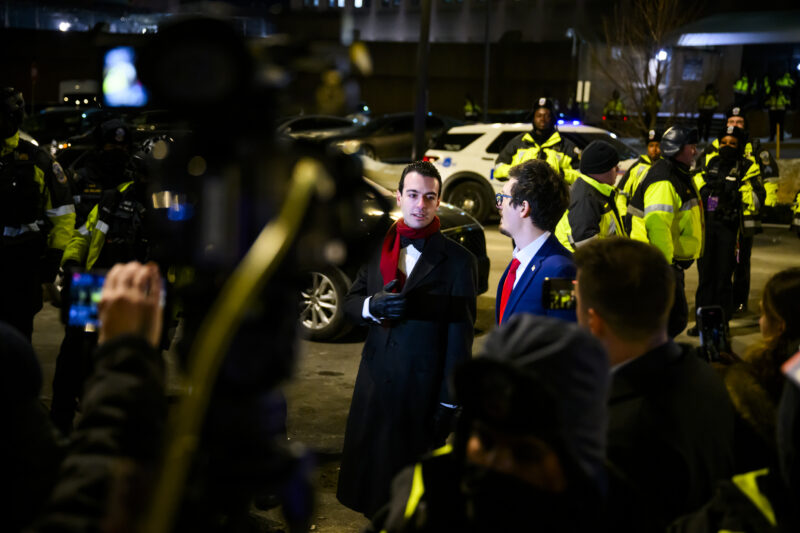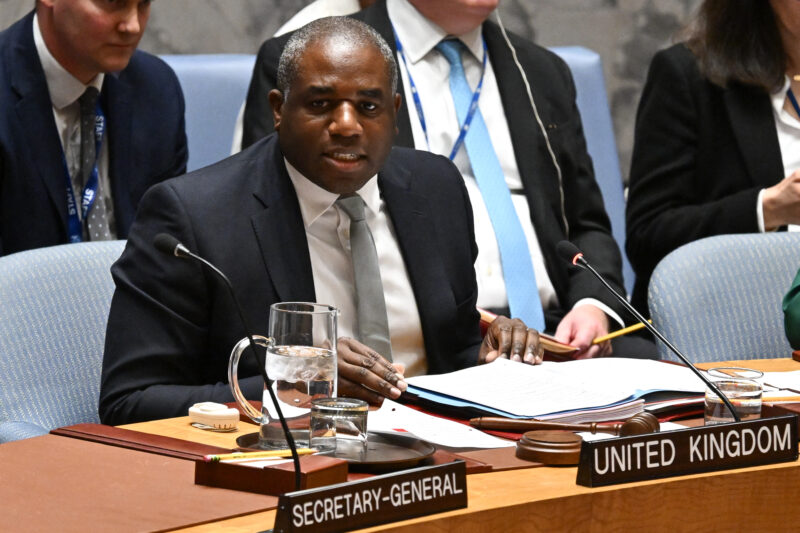House passes Israel aid bill 366-58, with 37 Dem, 21 GOP votes in opposition
The Israel portion of the bill also included $9 billion in humanitarian aid for Gaza and other theaters, support for U.S. military operations in the Middle East and $400 million in Nonprofit Security Grant Program funding

Drew Angerer/Getty Images
Speaker of the House Mike Johnson (R-LA)
The House voted 366-58 on Saturday to approve $14.3 billion in additional U.S. aid to Israel, one of four bills legislators voted on to provide $95 billion aid to U.S. allies and related military and humanitarian programs. Thirty-seven Democrats and 21 Republicans, largely representing the far-left and -right flanks of the parties, opposed the Israel funding.
Saturday’s vote is the clearest barometer of where support for Israel stands in the House six months after the Oct. 7 attack on Israel, and as Israel’s military operations against Hamas in Gaza have prompted an unprecedented level of condemnation of Israel from progressive Democrats. It also comes at a time of growing isolationism among Republicans, spearheaded by former President Donald Trump.
Asked what message the vote on Israel sent, House Speaker Mike Johnson (R-LA) told Jewish Insider, “It showed where the body was. That was an important part of this package because there was no route for Israel to get funding unless it was included in this, so that was really important.”
On the Democratic side, Reps. Becca Balint (D-VT), Don Beyer (D-VA), Earl Blumenauer (D-OR), Jamaal Bowman (D-NY), Cori Bush (D-MO), Andre Carson (R-IN), Greg Casar (D-TX), Joaquin Castro (D-TX), Judy Chu (D-CA), Mark DeSaulnier (D-WA), Lloyd Doggett (D-TX), Maxwell Frost (D-FL), John Garamendi (D-CA), Chuy Garcia (D-IL), Al Green (D-TX), Jonathan Jackson (D-IL), Pramila Jayapal (D-WA), Hank Johnson (D-GA), Ro Khanna (D-CA), Dan Kildee (D-MI), Barbara Lee (D-CA), Summer Lee (D-PA), Jim McGovern (D-MA), Mark Pocan (D-WI), Chellie Pingree (D-ME), Alexandria Ocasio-Cortez (D-NY), Ilhan Omar (D-MN), Ayanna Pressley (D-MA), Delia Ramirez (D-IL), Jamie Raskin (D-MD), Mark Takano (D-CA), Rashida Tlaib (D-MI), Bennie Thompson (D-MS), Jill Tokuda (D-HI), Nydia Velazquez (D-NY), Maxine Waters (D-CA) and Bonnie Watson Coleman (D-NJ) voted against the bill.
As a sign of the extent to which Democratic support for Israel has waned since the start of the war, just eight Democrats opposed funding for the Iron Dome missile defense system in 2021, although that bill did not include offensive weapons.
On the Republican side, Reps. Andy Biggs (R-AZ), Lauren Boebert (R-CO), Tim Burchett (R-TN), Andrew Clyde (R-GA), Eli Crane (R-AZ), Warren Davidson (R-OH), Scott DesJarlais (R-TN), Matt Gaetz (R-FL), Bob Good (R-VA), Paul Gosar (R-AZ), Marjorie Taylor Greene (R-GA), Andy Harris (R-MD), Thomas Massie (R-KY), Troy Nehls (R-TX), Cory MIlls (R-FL), Ralph Norman (R-SC), Scott Perry (R-PA), Matt Rosendale (R-MT), Chip Roy (R-TX), Tom Tiffany (R-WI) and Ryan Zinke (D-MT) voted no.
Fourteen Republicans had voted earlier this year against Israel funding without spending cuts.
Conservatives, particularly those affiliated with the Freedom Caucus, have for months expressed opposition to additional aid to Israel not tied to other government funding cuts. Republicans have also been frustrated by the foreign aid bill in general, objecting to humanitarian aid to Palestinians, a lack of border security policy, aid to Ukraine and Johnson’s work with Democrats to pass the legislation.
Johnson forcefully pushed back against arguments from some in his party that the humanitarian aid was effectively a giveaway to Hamas, noting it includes a ban on funding to the United Nations Relief and Works Agency and strict oversight provisions for aid.
Overall, the vote showed that strong majorities of both parties still support Israel, but this many votes against Israel would have been unlikely prior to Oct. 7.
The Israel portion of the bill also included $9 billion in humanitarian aid for Gaza and other theaters, support for U.S. military operations in the Middle East and $400 million in Nonprofit Security Grant Program funding.
After the vote, Ocasio-Cortez, Castro, Velázquez, Doggett, Jayapal, Khanna, Balint, Casar, Takano, McGovern, Barbara Lee, Blumenauer, Chu, Johnson, Casron, Watson Coleman, Garcia, Jackson and Tokuda released a joint statement released a statement insisting they “believe strongly in Israel’s right to self-defense” and are “committed to a sovereign, safe, and secure future for Israel” but oppose “offensive weapons that could result in more killings of civilians in Rafah and elsewhere.”
They also accused Israeli Prime Minister Benjamin Netanyahu of being “willing to sacrifice the hostages.”
The House also passed an aid bill for Ukraine by a 310-112-1 vote, with 112 Republicans opposing and one voting present; an aid bill for Taiwan and other Indo-Pacific priorities by a 385-34 vote, with 34 Republicans opposing and Tlaib voting present; and a national security policy bill including new Iran sanctions and legislation to force the sale of TikTok by its Chinese parent company by a 360-58 vote, with 25 Republicans and 33 Democrats opposing.
It voted 249-167, with 43 Democratic yes votes, to approve an amendment to the fourth bill, which requires a report to Congress on sanctioned Iranian assets and U.S. sanctions waivers; Democratic leadership had been urging a no vote on the amendment.
Speaking to Jewish Insider before the vote, Rep. Brad Schneider (D-IL) referenced a pro-Palestinian protest happening outside the Capitol building.
“The chant I heard outside as I was driving by them was, ‘Brick by brick, wall by wall, Zionism will fall,’” Schneider said. “They’re not calling for peace and calling for two peoples who belong to the same land living together and building a future together. They’re calling for the destruction of Israel and murder of the Jewish people. So I know which side I’m on.”
Rep. Kathy Manning (D-NC) noted that colleagues who voted against the Israel bill would also be voting against humanitarian aid and funding for the Nonprofit Security Grant Program, available to “any religious institution that’s considered high risk.”
“I hope they will also remember that this is a battle of the free world against terrorists and autocrats, and our adversaries are watching us,” Manning continued.
Rep. Debbie Wasserman Schultz (D-FL) framed the vote as a question of standing up for democratic values.
“This is an incredibly important moment for us to make sure that we can stand up for democracies, stand against terror, and make sure that we can provide desperately needed humanitarian assistance,” she said. “We all just need to stand together and push back against tyranny. That’s what’s at stake here.”
The foreign aid package, which now advances to the Senate as a single bill, has required a virtually unprecedented degree of Democratic support at every stage to advance over opposition from the far right.
Seventeen of the 56 Democrats who signed onto a recent letter calling for the U.S. to suspend aid to Israel and condition any future aid ultimately ended up voting for the Israel package: Reps. Jan Schakowsky (D-IL), Veronica Escobar (D-TX), Betty McCollum (D-MN), Melanie Stansbury (D-NM), Madeleine Dean (D-PA), Nancy Pelosi (D-CA), Sara Jacobs (D-CA), Paul Tonko (D-NY), Jahana Hayes (D-CT), Jared Huffman (D-CA), Sheila Jackson Lee (D-TX), Nanette Barragan (D-CA), Alma Adams (D-NC), Zoe Lofgren (D-CA), Tony Cardenas (D-CA), Rosa DeLauro (D-CT), Kevin Mullin (D-CA), and Anna Eshoo (D-CA).
Rep. Debbie Dingell (D-MI), who also signed the letter, did not vote due a medical emergency, and Del. Eleanor Holmes Norton (D-DC) cannot vote.
An attempt by Greene, Gosar and Massie to oust Johnson from the speakership over the Ukraine vote could come to fruition in the coming days, though Greene said she would wait until after the recess. It’s not clear yet how many other lawmakers will support the effort, but a growing number of Democrats are signaling they intend to bail out Johnson given his cooperation on the foreign aid bill.
Whether that’s a stable and sustainable solution for the House speaker, who said earlier this week he was willing to risk his speakership to do “the right thing” and advance aid, remains to be seen.















































































